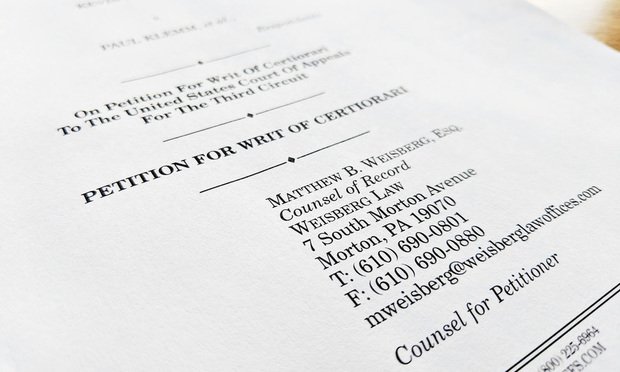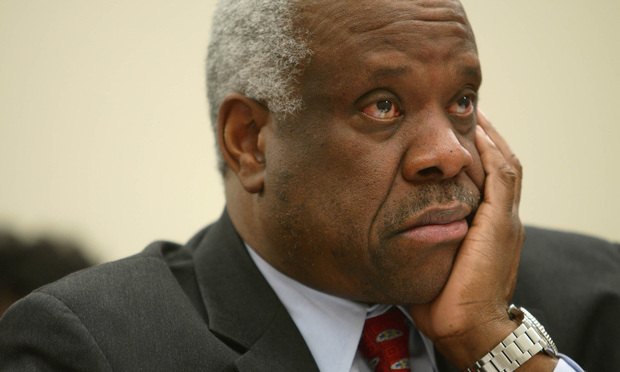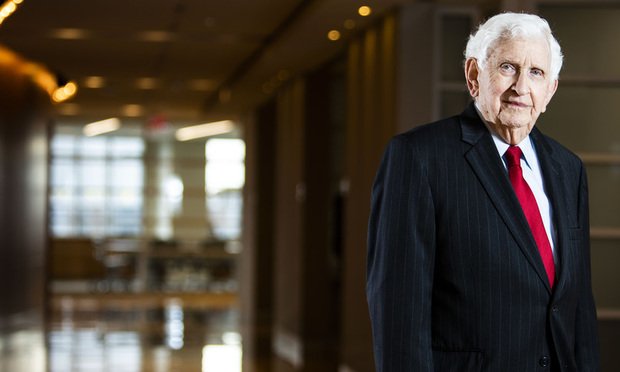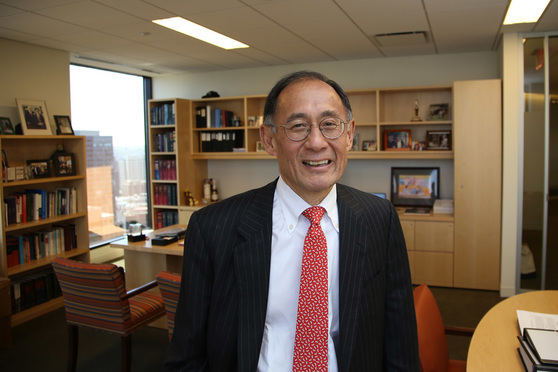This 8-Page Cert Petition Caught the Justices' Eyes | Clarence Thomas's Many Doubts | Meet the Last Supreme Court 'Crier'
Meet the Pennsylvania lawyer who won a cert grant from an eight-page petition. Plus, 95-year-old George Hutchinson is the Supreme Court's last "crier," and he's got a few stories to tell. Thanks for reading Supreme Court Brief.
March 06, 2019 at 07:00 AM
8 minute read
The Supreme Court begins its two-week break between February and March arguments with two justices heading to Capitol Hill tomorrow for the court's first public budget hearing since 2015. Justices Samuel Alito Jr. and Elena Kagan will appear before the House committee. We begin the break with a look behind a rare eight-page petition in a consumer case that won review last week. We also check in on Justice Clarence Thomas's continuing efforts to entice his colleagues into re-examining some of their doctrines and precedents. Thanks for reading, and contact us anytime at [email protected] and [email protected].

An 8-Page Petition Strikes Gold
Lawyers who file petitions in the Supreme Court usually land on 20-30 pages after taking advantage of every precious word in the rule's 9,000-word limit. But last week a rare eight-page petition hit the jackpot when the justices granted review in the consumer debt collection case Rotkiske v. Klemm. Matthew Weisberg of Weisberg Law in Morton, Pennsylvania, was counsel of record for Kevin Rotkiske in a case involving the Fair Debt Collection Practices Act. Weisberg told us he had three things uppermost in mind when writing the petition:
>> “I never argued nor submitted a petition to the Supreme Court, so I reviewed their rules. It says about 15 times—well, a lot of times—to be concise and get to the point. I took that seriously.”
>> “In drafting it, I recollected an interview with a Supreme Court justice—it was either Stevens or Souter—and that justice said they get what he called over-length briefs all the time, but every once in a while, he gets a thin one and knows that's a winner. I took that to heart.”
>> “It's a relatively precise issue (whether the 'discovery rule' applies to toll the one-year statute of limitations under the FDCPA) and the question presented is short. Other than presenting why they should take it, I remembered what Mark Twain once said and why: 'I apologize for such a long letter—I didn't have time to write a short one.'”
Weisberg, whose opposing counsel is Jones Day partner Shay Dvoretzky (whose brief in opposition was 12 pages), said he is excited and daunted by next term's argument. The idea of spending hundreds of hours preparing for the argument “is daunting for someone who has a small private practice,” said Weisberg who calls himself a “sole proprietor” with a number of of counsel and associated counsel relationships.
Weisberg said that within 24 hours of review being granted on Feb. 25, he had received about a half dozen inquiries from law school clinics, public interest groups and private lawyers who wanted to be co-counsel in his high court case. “They all promised tremendous collaboration but when I inquired as to details, they all wanted to be counsel of record on the brief and to argue the case,” Weisberg said.
Weisberg said he is not “shutting the door” to co-counsel, but, he added, “I know the case better than anyone. I've briefed it three times already and argued it three times. But this is the U.S. Supreme Court. It's a big deal. I'm listening to what everybody has to say, but ultimately I have a client and my client knows me and we've been at it for awhile.”
Weisberg has already signed up for a moot court at the Supreme Court clinic at Georgetown University Law Center and he is speaking with others about help with “the laboring oar.” As for his client, Weisberg said, “He is very excited. He said he can't believe he is going down in the annals of history.”

Clarence Thomas Has Many Doubts
Justice Clarence Thomas drew a fair amount of attention recently for questioning the foundations of two landmark Supreme Court decisions—Gideon v. Wainwright and New York Times v. Sullivan—and criticizing, once again, Roe v. Wade.
The justice most willing to reexamine high court precedents has yet to match his questioning record from last term—although there is still time. We went back to last term and found the following Thomas “grenades,” which, like this term so far, attracted only one other justice, one time—Justice Neil Gorsuch.
>> In the Fourth Amendment cell phone location data case, Thomas challenged the “reasonable expectation of privacy” test first articulated in Katz v. United States in 1967. He wrote: “The Katz test has no basis in the text or history of the Fourth Amendment. Until we confront the problems with this test, Katz will continue to distort Fourth Amendment jurisprudence.”
>> In another Fourth Amendment case in which the court refused expand the automobile exception to search of curtilages of homes, Thomas questioned whether the exclusionary rule should be extended to the states. He said the rule is not rooted in the Constitution or a federal statute.
>> In an immigration case where the court found the statutory definition of crime of violence void for vagueness, Thomas said he doubted that the modern vagueness doctrine was “consistent with the original meaning of the Due Process Clause.”
>> In the New Jersey sports betting decision, he questioned in a concurring opinion the court's modern severability precedents saying they are in tension with “longstanding limits on judicial power.” Although “no party in this case has asked us to reconsider these precedents,” he concluded, “at some point, it behooves us to do so.”
>> In the Texas racial gerrymander case, Thomas wrote: “I adhere to my view that §2 of the Voting Rights Act of 1965 does not apply to redistricting. Thus, §2 cannot provide a basis for invalidating any district, and it cannot provide a justification for the racial gerrymander in House District 90.” He was joined by Gorsuch. >> In the online sales tax decision, Thomas reiterated his view that there is no negative Commerce Clause—the doctrine that dates at least to the mid-19th century, prohibiting states from discriminating against out-of-state enterprises in favor of their own residents.
>> And in the travel ban case, Thomas wrote: “I am skeptical that district courts have the authority to enter universal injunctions. These injunctions did not emerge until a century and a half after the founding.”

Supreme Court Headlines: What We're Reading
• Supreme Court's Last 'Crier' Has Stories to Tell About Long-Gone Justices.Meet George Hutchinson (above), the 95-year-old of counsel at Finnegan, Henderson, Farabow, Garrett & Dunner who holds the title as the high court's last “crier.” Hutchinson shares his many memories of long-ago justices. [NLJ]
• Alito and Kagan Will Face House Members at Supreme Court Budget Hearing.“For the first time since 2015, two Supreme Court justices next week will go before a U.S. House of Representatives committee hearing to answer questions about the court's budget, an occasion that members of Congress have used in the past to raise a range of other issues.” [NLJ]
• What to Make of Chief Justice John Roberts Jr.? “The actions of Roberts, now at the middle of the court's ideological spectrum, reflect the instincts of a chief justice who wants to avoid wild fluctuations in the law, as well as criticism of the court as politically motivated in an increasingly polarized America.” [CNN] Bloomberg has more here.
• Jane Sullivan Roberts, Wife of Chief Justice, Opens DC Outpost for Recruiter MLegal. Legal search boutique Mlegal Group has tapped Jane Sullivan Roberts, a leading legal industry recruiter and wife of U.S. Supreme Court Chief Justice John Roberts Jr., to spearhead its move into the nation's capital, our colleague Ryan Lovelace reports. Jane Roberts had been a partner at Major, Lindsey & Africa since 2007. [NLJ]
• Supreme Court Will Decide if USPTO Can Collect Legal Fees. The U.S. Supreme Court has agreed to hear a dispute over attorneys fees between the U.S. Patent and Trademark Office and a company led by billionaire Patrick Soon-Shiong. [NLJ]
• Justice Ginsburg Keeps Busy as U.S. High Court's Writer-in-chief. “Ginsburg has now authored four of the court's 17 rulings in its current term, which started in October and ends in June, more than any of the eight other justices.”[Reuters]
• Justice Thomas Working Behind the Scenes to Boost Trump's Court Nominee. “Supreme Court Justice Clarence Thomas is working behind the scenes to boost the prospects of Neomi Rao, one of his former law clerks, to serve on a powerful federal appeals court in Washington—speaking privately with at least two Republican senators as she faces a contentious confirmation fight.” [The Washington Post]
This content has been archived. It is available through our partners, LexisNexis® and Bloomberg Law.
To view this content, please continue to their sites.
Not a Lexis Subscriber?
Subscribe Now
Not a Bloomberg Law Subscriber?
Subscribe Now
NOT FOR REPRINT
© 2025 ALM Global, LLC, All Rights Reserved. Request academic re-use from www.copyright.com. All other uses, submit a request to [email protected]. For more information visit Asset & Logo Licensing.
You Might Like
View All
Case Finally Closed on Apple, Samsung's Second Smartphone Trial
Trending Stories
Who Got The Work
J. Brugh Lower of Gibbons has entered an appearance for industrial equipment supplier Devco Corporation in a pending trademark infringement lawsuit. The suit, accusing the defendant of selling knock-off Graco products, was filed Dec. 18 in New Jersey District Court by Rivkin Radler on behalf of Graco Inc. and Graco Minnesota. The case, assigned to U.S. District Judge Zahid N. Quraishi, is 3:24-cv-11294, Graco Inc. et al v. Devco Corporation.
Who Got The Work
Rebecca Maller-Stein and Kent A. Yalowitz of Arnold & Porter Kaye Scholer have entered their appearances for Hanaco Venture Capital and its executives, Lior Prosor and David Frankel, in a pending securities lawsuit. The action, filed on Dec. 24 in New York Southern District Court by Zell, Aron & Co. on behalf of Goldeneye Advisors, accuses the defendants of negligently and fraudulently managing the plaintiff's $1 million investment. The case, assigned to U.S. District Judge Vernon S. Broderick, is 1:24-cv-09918, Goldeneye Advisors, LLC v. Hanaco Venture Capital, Ltd. et al.
Who Got The Work
Attorneys from A&O Shearman has stepped in as defense counsel for Toronto-Dominion Bank and other defendants in a pending securities class action. The suit, filed Dec. 11 in New York Southern District Court by Bleichmar Fonti & Auld, accuses the defendants of concealing the bank's 'pervasive' deficiencies in regards to its compliance with the Bank Secrecy Act and the quality of its anti-money laundering controls. The case, assigned to U.S. District Judge Arun Subramanian, is 1:24-cv-09445, Gonzalez v. The Toronto-Dominion Bank et al.
Who Got The Work
Crown Castle International, a Pennsylvania company providing shared communications infrastructure, has turned to Luke D. Wolf of Gordon Rees Scully Mansukhani to fend off a pending breach-of-contract lawsuit. The court action, filed Nov. 25 in Michigan Eastern District Court by Hooper Hathaway PC on behalf of The Town Residences LLC, accuses Crown Castle of failing to transfer approximately $30,000 in utility payments from T-Mobile in breach of a roof-top lease and assignment agreement. The case, assigned to U.S. District Judge Susan K. Declercq, is 2:24-cv-13131, The Town Residences LLC v. T-Mobile US, Inc. et al.
Who Got The Work
Wilfred P. Coronato and Daniel M. Schwartz of McCarter & English have stepped in as defense counsel to Electrolux Home Products Inc. in a pending product liability lawsuit. The court action, filed Nov. 26 in New York Eastern District Court by Poulos Lopiccolo PC and Nagel Rice LLP on behalf of David Stern, alleges that the defendant's refrigerators’ drawers and shelving repeatedly break and fall apart within months after purchase. The case, assigned to U.S. District Judge Joan M. Azrack, is 2:24-cv-08204, Stern v. Electrolux Home Products, Inc.
Featured Firms
Law Offices of Gary Martin Hays & Associates, P.C.
(470) 294-1674
Law Offices of Mark E. Salomone
(857) 444-6468
Smith & Hassler
(713) 739-1250






